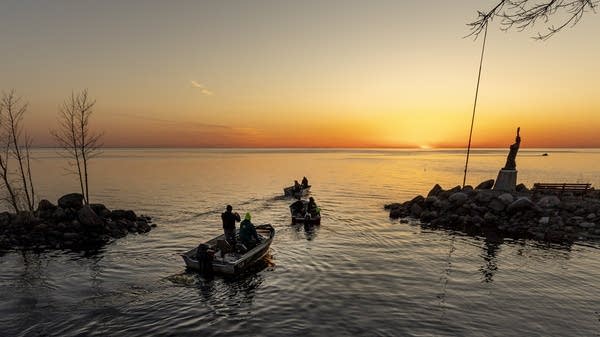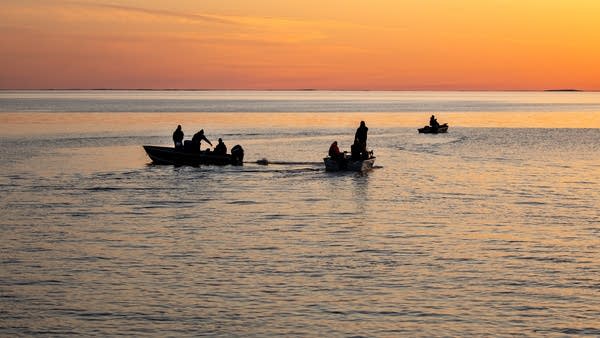Tribes’ spring fish harvest provides food, preserves culture

Go Deeper.
Create an account or log in to save stories.
Like this?
Thanks for liking this story! We have added it to a list of your favorite stories.
Bob Elm waited for the setting sun to dip below the horizon before heading out onto the chilly blue waters of Mille Lacs Lake.
At a public landing on the lake’s east side, he and other tribal members loaded spears and buckets into fishing boats, and donned helmets with headlamps attached.

"We use our lights to shine in the water,” Elm said. “The walleyes' eyes actually glow, or they reflect the light, so they're easy to see."
Elm is a member of the Lac du Flambeau Band of Lake Superior Chippewa, of northern Wisconsin.
Turn Up Your Support
MPR News helps you turn down the noise and build shared understanding. Turn up your support for this public resource and keep trusted journalism accessible to all.
It’s one of several Native American tribes that retain the right to fish on Mille Lacs, part of the territory the tribes ceded when they signed treaties with the federal government nearly two centuries ago. Those rights were later affirmed by the U.S. Supreme Court in the 1990s.
With the ice finally gone on most Minnesota lakes, the spring fish harvest is in full swing. Tribal members say the annual ritual of gathering fish through spearing or netting provides a vital food source for the community and preserves a cultural tradition.

On this clear evening, Elm is one of four dozen Lac du Flambeau members who made the nearly four-hour trek from Wisconsin to central Minnesota for a night of spearing on Mille Lacs.
"It's that time of the year and we like to harvest walleye, and it sure tastes good,” Elm said. “So we make the drive over here, get out of town and do a little adventure and come over to the big lake over here. We love it."
Elm’s son, Jeremy Schuman said the tribe’s name, Lac du Flambeau, means “lake of the torches,” a reference to the practice of harvesting fish by torchlight.
"It's always been part of our culture,” he said. “Our ancestors sustained themselves through the fisheries. So we like to keep that alive, and stay close to who we are."
Every year, the state of Minnesota and the tribes agree on the amount of fish that can be harvested based on the outlook of the lake’s fish population.
Each tribe declares to the Minnesota Department of Natural Resources how many of each fish species they intend to harvest from each lake in each ceded territory. The tribes issue permits to their members.

Before heading out onto the water, tribal members checked in with Adam Ray, a biologist with the Great Lakes Indian Fish and Wildlife Commission, who was seated on a pickup tailgate filling out slips of yellow paper.
They presented their tribal identification cards, and in return they received a permit with a unique number.
“When they come back in, they'll give us this card back,” Ray said. “We match up with the fish that they take, and make sure it's the same person that went out with the permit."
Each Lac du Flambeau member was allowed one permit to spear up to 30 fish. The walleye are running, and the experienced fishermen are skilled with the spear. Most took only an hour or so to catch their limit.
John Johnson Sr., Lac du Flambeau's tribal president elect, brought along his two grandsons, 15-year-old Edward Poupart and 11-year-old Ganebik Johnson. The elder Johnson said he spends a lot of time teaching tribal customs to youth.
"It's our job to teach them what we know, so they carry on the traditions,” he said.
The spear Johnson uses for fishing has metal tines that have been worn down several inches since he crafted it decades ago.
"That's how long it's been feeding our community,” he said.

Before the boats cast off, Elm said they'll take a moment to thank the lake for always providing.
"We make an offering to water, the water spirits here, before we take anything,” he said. “That just ensures us that there'll always be something for us to take. We always give before we receive. It’s part of our culture.
Most of the fish speared will be frozen and shared with family members all year long, Elm said.
"We try not to waste anything,” he said. “Even the guts will be used for people's gardens sometimes."
Not all tribal members use a spear to catch fish. Gillnetting also is allowed for some tribes.

Darrell Shingobe, a member of the Rice Lake and Sandy Lake communities of the Mille Lacs Band of Ojibwe, shoved off from shore in a red canoe with his cousin just before twilight to set gillnets.
"One of the biggest things that we like to do is be out here on the lake,” Shingobe said. “I guess it's kind of hard to explain, unless you're out there."
Shingobe said he will return early in the morning to check the nets, which he hopes will be full of fish to share with relatives and use for tribal ceremonies.
Fishing reminds him of the simpler things of life, Shingobe said, and it also provides an important food source for the community.
"During this pandemic, it's sustained a lot of our people, a good healthy diet” he said. "Everything we eat nowadays is all preservatives. They say salt and sugar are killing us."
Careful tracking
After the boats returned, the spearfishers carried their teeming buckets ashore, and work began to document and record each fish.

Ben Michaels, a GLIFWC biologist, said every fish that comes into the landing, whether speared or netted, is counted and weighed.
"A lot of people think that the tribes come to these landings, they take what they want, they leave, they have unlimited quota, the fish aren't counted,” he said. “That can't be further from the truth."
On a sample of the fish, Michaels said they gather more detailed biological information, including tiny inner ear bones called otoliths that have rings like a tree. The biologists can determine the age of the fish by counting the rings, he said, and use that information to help determine the lake’s fish population.
Once the counting is done, Michaels said the GLIFWC staff calculate how close the band is to their quota, and whether the spearfishers can get another permit to go back out again.
"The quotas are created to protect the health of the fishery, so that we don't over-fish,” he said.

Long, bitter struggle

When Ojibwe bands in the Upper Midwest ceded most of their land to the federal government nearly 200 years ago, many of the treaties they signed explicitly reserved the right to fish and hunt outside their reservations.
But for many years, state officials never recognized those rights. So, in the 1970s, two brothers from Wisconsin decided to press the issue.
In 1974, Fred and Mike Tribble of the Lac Courte Oreilles Band of Lake Superior Chippewa speared fish off their reservation and were arrested. They sued, and while it took several years, eventually they won.
In 1987, band members began spearing and gill netting walleye. But they were met often with fierce opposition and blatant racism.
Three years later, the Mille Lacs Band of Ojibwe sued Minnesota over rights to harvest fish from Mille Lacs Lake, the most prized walleye fishery in the state.
The band and the Minnesota DNR negotiated a compromise that would have ended the lawsuit, but the state Legislature voted it down.

Don Wedll, natural resources commissioner for the Mille Lacs Band at the time, said while Minnesota avoided some of the racial tension that Wisconsin experienced, there was still a lot of resentment.
Kids wore t-shirts to area schools that read "Save a walleye, spear an Indian," Wedll said. He remembers one Saturday morning fielding questions from about 300 angry community members around Mille Lacs Lake.
"I walked out of there, and some lady came up, started yelling at me and said, ‘I hate you. I hate you,’” he said. “And [then] she said, ‘But I really have to respect that you went up there and did that.’”
Wedll said for six months, he and his family had FBI agents guarding them, “because of all the death threats and all the craziness that was going on." But he said his message to local opponents at the time was relatively straightforward.
“It's a right that exists for a long, long time,” he said. “And people need to acknowledge that the tribal governments have a right to access a share of the natural resources that are owned by the tribal governments, and the tribal people."
The Mille Lacs Band was joined in its lawsuit by six Wisconsin Ojibwe Bands who had also signed the 1837 treaty. They won in federal court, but the case was appealed all the way to the U.S. Supreme Court.

Mille Lacs Band Chief Executive Melanie Benjamin said she'll never forget the day in 1999, when a woman at the front desk of tribal headquarters got the call that the Supreme Court had ruled in the band's favor.
"She got on the loudspeaker at the time and said, ‘We won, we won, we won,’” Benjamin recalled. “And the whole building just went ballistic with pride and happiness and relief."
Nearly 25 years after that ruling, a lot of misunderstandings about tribal treaty rights remain, Benjamin said.
"I think people don't realize this is actually a governmental contract in a sense. It's contract law,” she said. “We gave up certain rights, and we gave up those rights in exchange that we could hunt and fish and gather within the 1837 treaty area forever. Our forefathers knew how important that was to us.”
Benjamin said Ojibwe, or Anishinaabe, people believe that foods like walleye were put on the earth to help sustain them.
"We've been told that these foods were put on the earth for us, by who we call the manidog,” she said. “So we have a connection to the earth, and that food was there for our subsistence."
Bradley Harrington, tribal liaison for the Minnesota DNR and a Mille Lacs tribal member, remembers getting in fights in grade school when the case was being litigated. He speared for the first time in 2000, when he was 19.
"I was fortunate enough to have some good mentors,” he said. “They would tell me the stories about having to hide from wardens, and then have their buoys just below the water and know where they're at in the dark – because they're being charged for it, but yet still had to feed people.”
Harrington now takes his 12 and 13 year old boys spearfishing. He said the treaty rights they exercise not only provide food for the community, they also nourish their Anishinaabe spirit.
"It's more than pulling a fish out of the water with a spear,” he said. “There's an agreement there between that particular fish and the person spearing it, where that fish gives its life to the person harvesting them."
‘Irritating’ harassment
The May 3 evening when the Lac du Flambeau spearfishers visited Mille Lacs was peaceful. But tribal members who spear or net say they frequently face harassment.

"I don't see it a lot, but I know that our tribal members face it on probably on a nightly basis, at least what I hear back home in Wisconsin,” said Gale Smith, a GLIFWC conservation warden and a Lac du Flambeau member.
Smith said he previously witnessed obnoxious behavior at another public landing on the west side of Mille Lacs, just off U.S. Highway 169.
"I specifically remember last year there was quite a bit, whether it was honking or flipping the bird or yelling out the window,” he said.
While that behavior is mainly annoying, sometimes the harassment becomes threatening.
In February, a 23-year-old Lino Lakes man was charged with harassment for allegedly yelling obscenities, exposing himself and threatening to shoot a family as they spearfished last spring on Mille Lacs.
Smith said he tries to maintain a visible presence to ward off any problems, and advises people not to respond to harassers.
"It's irritating, it's frustrating,” he said. “But any chance I can, I tell a tribal member [to] take that high road with somebody that's purposely trying to get a reaction out of you."
Smith’s uncle, Scott Smith, has been spearfishing since he was a kid, and said harassment has improved from days past.
"It's gotten better,” he said. “I remember the days of getting shot at, getting rocks thrown on you, spit on you, beer bottles thrown at you."
His fishing partner, Kevin Maulson, said such reactions are rooted in ignorance of tribes' legal rights to hunt and fish in the ceded territory.
"It's a right given to us in our treaties,” Maulson said. “That's what a lot of non-Indians don't understand. It's a privilege for them to fish and have permits, but it's a right for us, given to us by the federal government."


